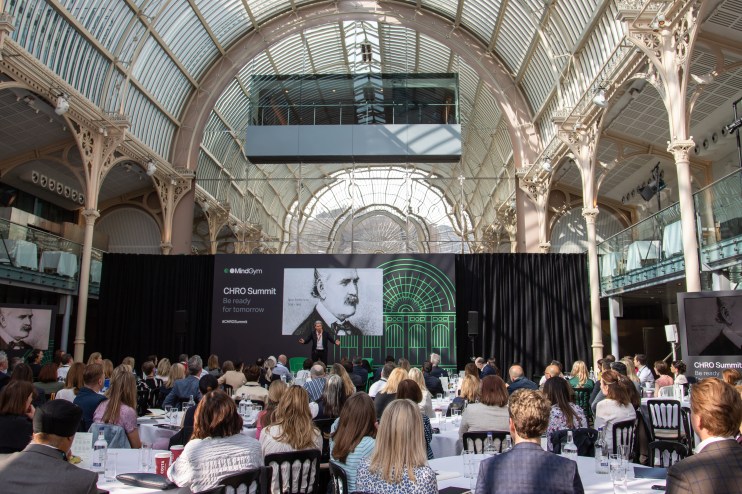The Notebook: Octavius Black on HR’s ‘Davos’, how to fix low productivity rates and wellbeing

The Notebook is a column where interesting people say interesting things: today, it’s Octavius Black, CEO of learning platform MindGym, to discuss productivity, wellbeing and workplace culture’s Davos.
Big hitters gather to look at HR’s biggest 2023 challenges
The floorboards of the Royal Opera House have been trodden by many a global superstar over the years – but last month they were taken over, not by the stars of art and culture, but by some of the biggest names in workplace culture.
Baroness Martha Lane Fox, Dame Emma Walmsley, Simon Sinek, Sir Trevor Phillips and Matthew Syed were just five of 26 world-class speakers who joined us at Mindgym’s ‘Davos of HR’ to solve some of the biggest HR challenges facing today’s business leaders.
Addressing an audience of 160 senior HR leaders from some of the world’s largest companies (from Shell to Chanel, Nestle to Unilever, Meta to Deepmind, Burberry to Barclays, the Bank of England to Deutsche Bank, Rolls Royce to British Aerospace) – our experts offered clear-sighted advice on how to navigate these challenges.
What to do about productivity, flatlining in the UK since the 2008 recession (and since the birth of social media, as one of our speakers pointed out), topped the agenda. Our experts unpicked the impact poor leadership has had on productivity, debated whether more robust, evidence-based leadership coaching could help transform productivity, and explored which can do more to transform productivity: psychology or technology?
Employee wellbeing, in free fall since the start of the pandemic, was another key point of contention – in particular the dilemma of how to improve wellbeing without compromising productivity.
The elusive challenge of culture change, often held up as a North Star for attracting and retaining talent, also featured, as did ‘What would make tomorrow’s leaders better than today’s?’ (In the past decade, investment in leadership development doubled, but trust in senior leaders fell by a third).
For each of these dilemmas, behavioural science seems to offer the answers.
Can companies improve wellbeing without reducing workload?
With studies showing the $50bn+ companies spend on “wellness” initiatives is largely wasted, Mindgym’s psychologists have identified what to do instead that will make a difference.
Out with meditation apps, free fruit and yoga classes and in with rebuilding workplace culture around the five drivers that have most effect on workplace wellbeing: certainty, competence, autonomy, belonging and purpose.
Not only will this greatly improve staff wellbeing, stemming the flow of lost workers to the workforce, it also transforms productivity and performance, enhances creativity and increases workplace commitment.
Precision Coaching: the key to reigniting productivity?
Over recent years, the birth of a number of 1:1 digital coaching platforms has promised to unlock scalable productivity and performance gains across the corporate world – but thus far, their promise has fallen flat.
MindGym’s new whitepaper, ‘Precision Coaching: Better, faster, always’, is the most extensive analysis to date of peer-reviewed studies on coaching. Our research reveals why most coaching is a ‘Russian roulette’ – delivering highly variable results, with performance changes after coaching ranging between + 97% to making things worse. The average improvement is 7%, although several recent studies show no change in performance at all.
MindGym’s new, scientific ‘Precision Coaching’ method is proven to consistently transform productivity thanks to its roots in the psychology of behaviour change.
Can I quote you on that?
I think investing in development and investing in leadership and management skills is one of the most important things we ever, ever do.
Dame Emma Walmsley, CEO, GSK.
What does it take to change culture, and is it worth it?
Culture change is coveted as a cure-all by much of the corporate world, but famously tricky to sustain (especially for larger companies).
James Bardrick, Head of Citi, UK, and Jenny Grey, Global Head of Accountability, Culture and Talent Transformation at Citi, joined us at the Summit to share their journey to transform the culture of one of the world’s largest banks, with MindGym as a partner.
From the Habit Labs we built together, to the 5,000 Changemakers we recruited to “reset” cultural norms worldwide, Citi’s case study offered a shining example in how to change culture for good, one habit at a time. Watch the full session to find out more.
A real read on AI’s impacts
To quote Tessa West, associate professor of psychology at New York University, and a member of Mindgym’s academic board: “We need to recalibrate away from wellness and towards the psychological components of wellbeing within the workplace.”
I, Human argues compellingly that artificial intelligence is altering human intelligence – fuelling narcissism, diluting self-control, reinforcing prejudice – and reveals how human learning can still counteract the malign effects of machine learning.
Tomas’s easy style and dry humour belie the seriousness with which he tackles this vital issue of our time.
Take note before the robots take over how you think.
I Human: AI, Automation and the Quest to Reclaim What Makes Us Unique, by Tomas Chamorro-Premuzic
